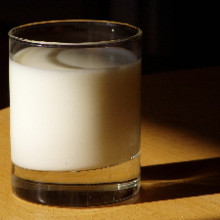Are humans the only species to drink the milk of another?
When you think about it, drinking the milk of a cow is a little odd. Are we the only animal in the world that drinks the milk of another species? Why do we drink it anyway? Plus, we ask how Braille is processed in the brain.
In this episode

00:00 - Are humans the only animal to drink milk from other species?
Are humans the only animal to drink milk from other species?
Diana - Most of us will have seen our pets and various garden wildlife taking advantage of a source of cow's milk on occasion. But are we the only ones to drink it habitually?
Oliver - I'm Oliver Craig and I work at University of York in the Department of Archaeology.
In fact, we are - well at least, we are when we're adults. All juvenile animals can drink milk and that's because they have the enzyme lactase to digest the milk sugars. But the genome that makes the enzyme gets switched off when they get to a certain age, so as adults, they can't drink it. Most humans in fact can't drink milk as adults and there's only a very small fraction of the world's population who can. What's really interesting of course is that those people live in a very geographically restricted area, i.e., Northwest Europe and some parts of Africa. So it's a really interesting question as to why only a certain part of the population can drink milk.
If you're lactose intolerant, you don't possess this enzyme lactase. So basically, the lactose that's in the milk doesn't get digested. It's a disaccharide and it passes straight through the gut and goes into the colon, and it can cause all sorts of unpleasantness, including what's generally quoted as some kind of explosive diarrhoea, and is a really, really nasty condition if you can't actually break these sugars down. But it also causes problems with water retention and all sorts of other problems as well. So really very ill, bad stomach and not actually been able to digest the sugar itself. So at some point in our history, it was a selective advantage for people in Northwest Europe at least to be able to drink milk.
Diana - But does being lactose intolerant really put you to selective disadvantage?
Oliver - Well, you wouldn't have thought it would really, would you? It's not going to impact on your daily life massively. It's only going to be selective disadvantage if there's a real advantage in being able to drink milk, fresh milk. It comes back to the question then, why is being able to drink milk such a selective advantage? The answer is that we really don't know and that's what we're trying to research and find out. The first thing that we need to do is find out when or at what point in our history did that need to drink milk actually occur?
Diana - As far as we know, humans are the only animals to drink another species milk regularly, but only a small proportion of humans have the lactase enzyme. Cats and dogs are often seen taking delight in a serving of milk, though I'd rather not consider the consequences. An excellent find on our forum came from Jackass Penguin who cited the Red Billed Oxpecker, a bird that can perch on the udders of an Impala and drink its milk. Elsewhere, in Isla de Guadalupe, feral cats, seagulls, and sheathbills have been observed stealing the milk directly from the teats of elephant seals. So perhaps milk stealing does happen a little more than we currently know.









Comments
Add a comment